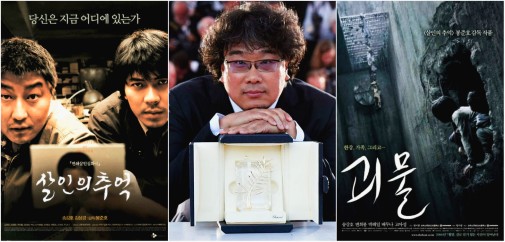In this Team Experience series, contributors catch up with gaps in their film history. Here's Cláudio Alves...

With Parasite making history and Bong Joon-ho more celebrated than ever, it's a good time for me to watch the two films that propelled the Korean director to his first waves of international success. I had never seen 2003's Memories of Murder and 2006's The Host so I was eager to correct that.
The first film is based upon real events, telling a story of police investigation and serial killing, while the second is a sort of South Korean answer to Godzilla's prismatic view of national trauma as monster movie hijinks. Not unexpectedly, I found myself in awe of both pictures…

Memories of Murder is a crime drama based on a true story that happened in South Korea from 1986 to 1991 when the country was under an autocracy. To this day, the Hwaseong serial murders are considered one of the most infamous crimes in Korean history. Part of the cultural impact of the horror comes from the fact it was unsolved for decades. Only in 2019, long after any legal prosecution was possible, did the perpetrator confess. That means that, at the time of production, Bong's film was conspicuously devoid of a conclusion. This lack of closure haunts Memories of Murder.
Bong Joon-ho is great at tonal somersaulting and his talents are certainly put to task in this narrative, whose emotional shifts can be as gradual as the setting sun or so quick they give you whiplash. Sometimes, he even does this in one shot, foregrounding petty drama with a background of sexual comedy only for both dynamics to be interrupted by the reminder of human loss. The laugh he forces onto his spectator becomes hoarse and turns into a cry of despair full of coughed-up blood.

The technical craft in all of this is never hidden but it works organically. Part of the genius lies in the economy and ingenuity on display like the he blocking and staging of actors. Their movements and pointed looks are of particular brilliance, setting precise cinematic rhythms in consonance with the arrhythmia of lived-in humanity. There are plenty of little grace notes peppering the action set pieces, behavioral idiosyncrasies and gestures so often repeated they've become automatized motion. It's not all formal splendor and acting details, of course.
There's a tragedy in the center of this storm and Bong never loses sight of it. The stench and weight of Death infects everything it touches, violence spreads like a virus that turns the world into a pit of bleak despondency. Even the weather becomes an accomplice of anguish, each raindrop like the ticking of a clock counting down to another explosion of senseless carnage. It's like a message from the Heavens. Or is it from Hell? Maybe that's what our fumbling protagonist is thinking when, in a final act of impotency to stop evil, he looks straight at the camera, at us, at the murderer, and silently asks a myriad of questions too painful to verbalize.

The Host didn't impress me as much as Memories of Murder, though it shares many of its strongest elements. The high contrast cinematography full of inky blacks is here as are the plays with genre and vertiginous tonal rollercoasters. Bong again commands the audience's attention like a maestro conducting an orchestra. One needs to be a master if one intends to make an allegory about post-war Korea and American aggression through a leviathan made out of parasitical limbs with a vagina dentata for a mouth. Thankfully, Bong Joon-ho is a master.
The director starts his nightmarish tale with a dramatization of a real occurrence when a Korean mortician working for the US military was ordered to dump toxic chemicals down the drain. In Bong's story, these chemicals mutate marine life, turning the Han River into the habitat of the aforementioned monster. One day, it jumps out of the water and starts attacking the populace, taking with it a schoolgirl whose family will attempt to save her. Until the fateful rescue, however, much happens, including nasty rumors of a virus and the forceful collaboration of a trio of dysfunctional siblings.

It all creates an experience of chaotic hysteria that only ever stops to heighten the tension with a tableau of children in danger or a waterfall of bones. The Host is a slippery thing, always moving but never holding on to any specific genre, preferring to free-style its narrative until it can no longer sustain itself. The actors do a lot of work anchoring this to human reality and it all mostly succeeds. Still, I would be lying if I said this was all peaks and no valleys, quality-wise. There's some dead weight in the middle and while that's not too troubling, it does make it a bit less than perfect when compared with other works such as Mother, Parasite or Memories of Murder.
Other episodes of this series:
M (31) by Mark Brinkerhoff
Rear Window (54) by Chris Feil
Z (69) by Mark Brinkherhoff
Cabaret (72) by Ben Miller
Enter the Dragon (73) by Cláudio Alves
The Parallax View / Three Days of the Condor (74/75) by Lynn Lee
Farewell, My Concubine (93) by Tim Brayton
While You Were Sleeping (95) by Cláudio Alves